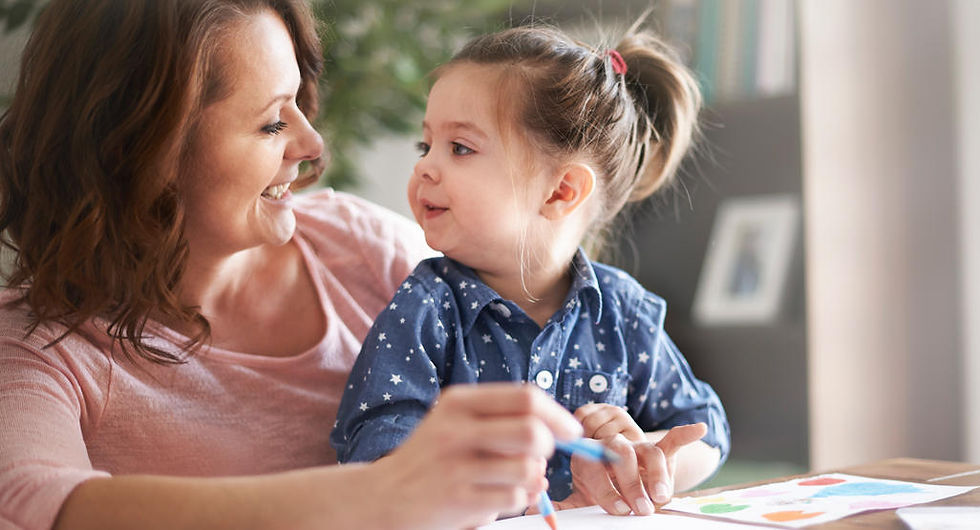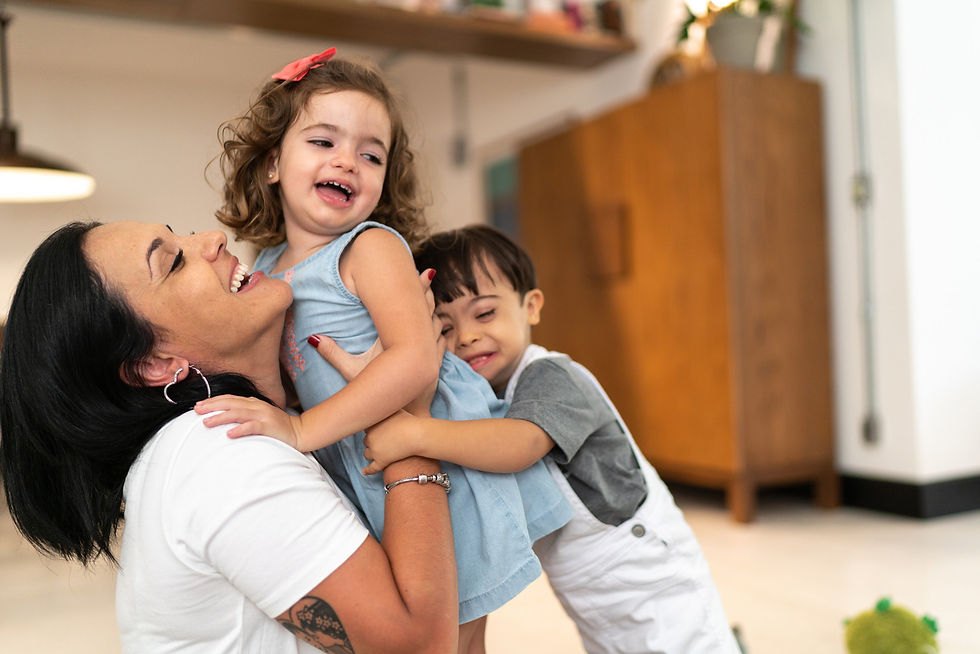Benefits of Cooking with Children
- club9313
- Feb 27, 2020
- 5 min read
Updated: May 22, 2020
Most of us have the task to prepare food either with our own children, or for the children that we care for. Whether you are preparing a meal, making a snack or baking together, this is an excellent opportunity to have some fun and to learn a lot together. We have gathered and listed some of the strong benefits of cooking with children.

Safety note: Please be careful when using sharp skewers, knives and heated objects whilst cooking with children.
Increases Language Development
As you cook, you are labeling ingredients which increases a child’s vocabulary. Children also have to follow directions and instructions which enhances receptive language skills. You could ask the child to identify or act out the imperative (bossy) verbs in each instruction, such as stir, chop, mix, peel.
While cooking, also explain each step - ask the child to describe what they are doing for even greater language development. For more advanced learning, have them predict what will happen next or guess what the next ingredient would be.
The senses we use while cooking and eating are a great opportunity to broaden vocabulary. Asking a child what they see, taste and smell will give you both a chance to describe. E.g. the chicken smells yummy, the cake feels soft and the strawberries are bright red!

Enhances Fine Motor Skills
Mixing the ingredients, rolling the dough and using cookie cutters are all great ways to enhance a child’s fine motor strength and control. These are skills needed to develop academic skills such as writing, cutting and colouring. Help improve these skills even more by allowing them to slowly pour ingredients into a bowl or quickly mix ingredients together. For older children, encourage them to crack eggs, grease cake tins, whisk ingredients and help flip pancakes.

Increases Maths Ability
Cooking involves a great deal of measurement. Children will learn various measurements such as cups, grams, milliletres, teaspoons and tablespoons. They will also understand fractions as well as utilise addition and subtraction skills.
Cooking is extremely visual and practical, both 2-D and 3-D shapes can be discussed, used and made.
Younger children that are learning to identify numbers can help you read them on scales, you could ask them to let you know when they see the number that you need and tell you when to stop. There is a lot of counting involved, for example they can count number of eggs being cracked.
Time is also a very important part of cooking. If a cake takes 15 minutes to bake in the oven then you could ask a child, how many 5’s are in 15? If it has been in the oven for 10 minutes, how much cooking time is left?
If you ask any teacher, they will tell you to cook with children will really help to enhance basic maths skills!

Improves Reading Skills
When cooking with your children, have them read the recipes. For the younger children, start with the numbers such as “2” cups of flour and “4” tablespoons of cocoa powder. If they are learning to read through learning Phonics then ask if they can sound out any words in the recipe, for example ch - o - p
For older children, ask them to read each step then follow the directions. This also helps enhance reading comprehension.

Introduces Children to Scientific Concepts
Cooking involves a great deal of science. Children learn what happens when certain ingredients are mixed together as well as what happens when the measurements are incorrect. It’s a really fun way to look at solids becoming liquids and then a solid again. It also demonstrates what happens when heat or cold is applied to different foods. For example, what will happen to the sugar if we heat it up? Or, What do you think will happen to the jelly if we put it in the fridge?

Increases Focus and Attention
When cooking, children need to stay focused and pay attention to each detail or the recipe will not be completed correctly. Children learn quickly that they have to pay attention to each step and each instruction. If they follow each step with your guidance then the ingredients will turn into a delicious brownie or cookie at the end!

Can Help With 'Picky Eaters'
Feeding children can be fraught with emotion, the desire to keep your children healthy and happy is very strong. It can be quite an unsettling experience when a child starts shunning everything you put in front of them. A great way to solve this is to get them involved. Browse through a cookbook together, or take a look at recipes online and let them contribute ideas to a weekly meal plan. You could also try taking them shopping to a market or supermarket and letting them select a fruit or vegetable they want to try.
If you've got a serious veg-dodger on your hands then there are plenty of sneaky ways of getting the good stuff into them. Recipes like Spaghetti & meatballs with hidden veg, More-veg-less-meat Summer Bolognese and Pasta with tomato & hidden veg can soon start racking up their 5-a-day. Finishing a meal with fresh puds like frozen fruit sticks is a great way of adding extra nutrients, too.

Teaches Life Skills
Cooking is a skill that is needed to be an independent adult. Children enjoy learning how to make their own sandwich, pour milk or make a meal. Older children show visible pride when they can learn to cook meals for themselves and their family. This will allow them to be more independent and responsible individuals. Cooking also teaches children various safety lessons, such as not to touch a hot stove or how to use a knife correctly.

Promotes Healthy Eating
Allowing children to cook, helps them learn what foods are healthy and what are not. It allows them to try new food that they may have not tried otherwise. It encourages them to eat at home instead of out which can often provide unhealthy options.

Boosts Self-Confidence
When a child is able to successfully complete a recipe and make a meal, they feel a sense of pride and confidence. In addition, as children cook more their level of independence increases which in turn boosts their level of self-confidence and self-esteem.

Encourages Bonding
Cooking is a task that you and your child can both enjoy! Make it a routine to cook Sunday dinner together each week or turn Friday night into make your own pizza night. Cooking together creates a bonding experience.

Curriculum links to explore with Food-
Shapes - 2D and 3D e.g. What shape is the cake tin? How many sides does it have? How many corners does it have?
Counting - How many grams of flour do we need? Can you find that number on the scale for me? Can you count in any other languages?
Colours - What colours can you see? Can you say those colours in any other languages?
Senses e.g. taste, smell, touch - What does it taste like? Does it smell nice?
Verbs e.g. ´doing/action words´ - cut, chop, peel, mix, slice, dip
Adjectives e.g. What does it taste like? Sweet, yummy, juicy, delicious
How does it feel? Squishy, bumpy, smooth, soft
Geography e.g. Where in the world can we find strawberries? Where did the fruit come from? Can you grow it where we live?




Comments